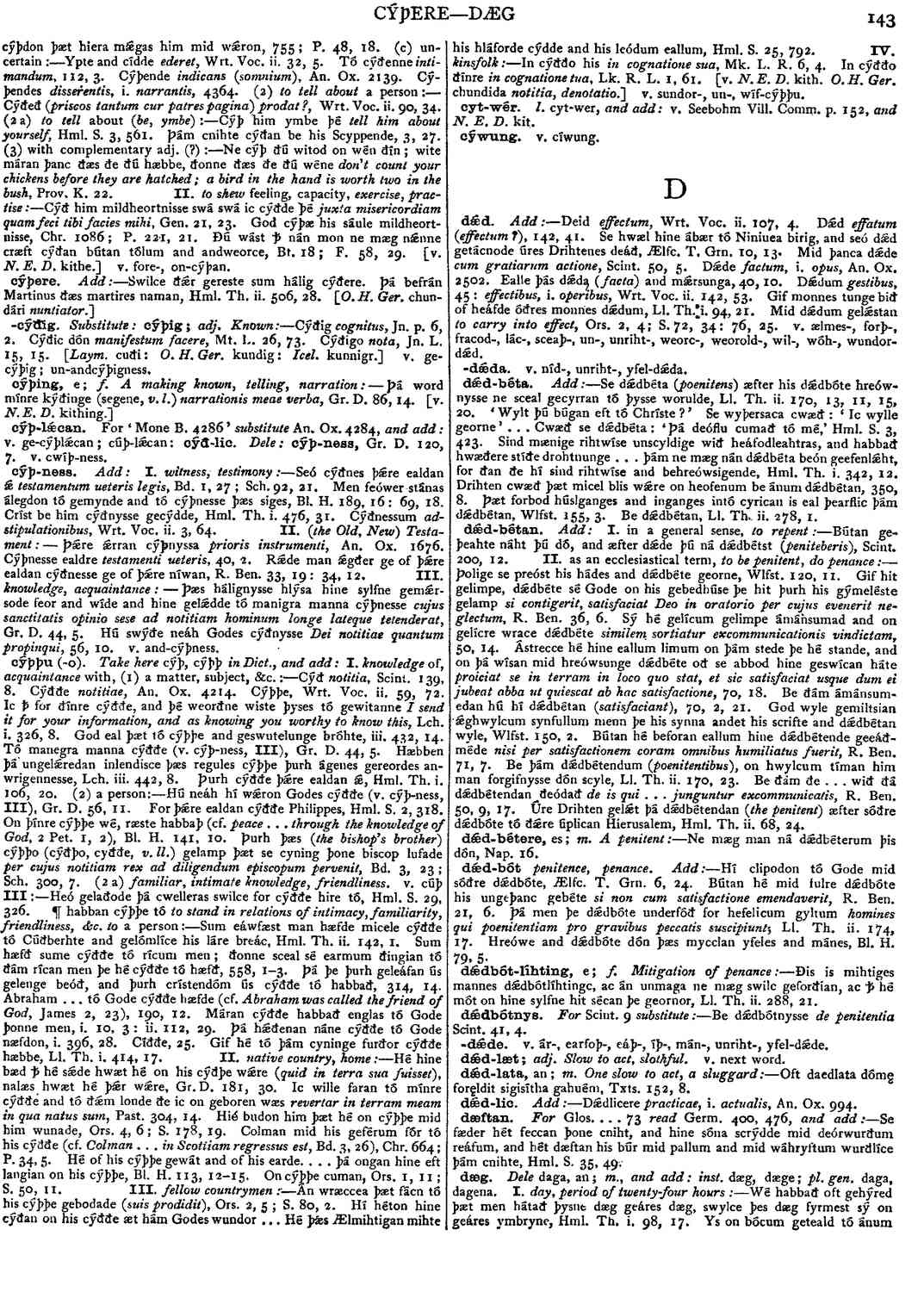cýþþu
-
Cýð
notitia,
- Scint. 139, 8.
-
Cýððe
notitiae,
- An. Ox. 4214.
-
Cýþþe,
- Wrt. Voc. ii. 59, 72.
-
Ic ꝥ for ðínre cýððe, and þé weorðne wiste þyses tó gewitanne
I send it for your information, and as knowing you worthy to know this,
- Lch. i. 326, 8.
- God eal þæt tó cýþþe and geswutelunge bróhte, iii. 432, 14.
- Tó manegra manna cýððe (v. cýþ-ness,
- Hú neáh hí wǽron Godes cýððe (v. cýþ-ness,
-
Heó gelaðode þá cwelleras swilce for cýððe hire tó, Hml. S. 29, 326. ¶ habban cýþþe tó
to stand in relations of intimacy, familiarity, friendliness, &c. to
a person :-- Sum eáwfæst man hæfde micele cýððe tó Cúðberhte and gelómlíce his láre breác,- Hml. Th. ii. 142, 1.
-
Sum hæfð sume cýððe tó rícum men; ðonne sceal sé earmum ðingian tó ðám rícan men þe hé cýððe tó hæfð,
- 558, 1-3.
-
Þá þe þurh geleáfan ús gelenge beóð, and þurh crístendóm ús cýððe tó habbað,
- 314, 14.
-
Abraham . . . tó Gode cýððe hæfde (cf.
Abraham was called the friend of God,
James- 2, 23), 190, 12.
- Máran cýððe habbað englas tó Gode þonne men, i. 10, 3: ii. 112, 29.
- Þá hǽðenan náne cýððe tó Gode næfdon, i. 396, 28.
- Cíððe, 25.
-
Gif hé tó þám cyninge furðor cýððe hæbbe,
- Ll. Th. i. 414, 17.
-
Hé hine bæd ꝥ hé sǽde hwæt hé on his cýðþe wǽre (
quid in terra sua fuisset
), nalæs hwæt hé þǽr wǽre,- Gr. D. 181, 30.
-
Ic wille faran tó mínre cýððe and tó ðǽm londe ðe ic on geboren wæs
revertar in terram meam in qua natus sum,
- Past. 304, 14.
-
Hié budon him þæt hé on cýþþe mid him wunade,
- Ors. 4, 6; S. 178, 19.
-
Colman mid his geférum fór tó his cýððe (cf.
Colman . . . in Scottiam regressus est,
- Bd. 3, 26), Chr. 664; P. 34, 5.
-
Hé of his cýþþe gewát and of his earde. . . . þá ongan hine eft langian on his cýþþe,
- Bl. H. 113, 12-15.
-
On cýþþe cuman,
- Ors. 1, 11; S. 50, 11.
-
Án wræccea þæt fácn tó his cýþþe gebodade (
suis prodidit
),- Ors. 2, 5; S. 80, 2.
-
Hí héton hine cýðan on his cýððe æt hám Godes wundor . . . Hé þæs Ælmihtigan mihte his hláforde cýdde and his leódum eallum,
- Hml. S. 25, 792.
-
In cýððo his
in cognatione sua,
- Mk. L. R. 6, 4.
-
In cýððo ðínre
in cognatione tua,
- Lk. R. L. 1, 61.
Bosworth, Joseph. “cýþþu.” In An Anglo-Saxon Dictionary Online, edited by Thomas Northcote Toller, Christ Sean, and Ondřej Tichy. Prague: Faculty of Arts, Charles University, 2014. https://bosworthtoller.com/42513.
Checked: 0